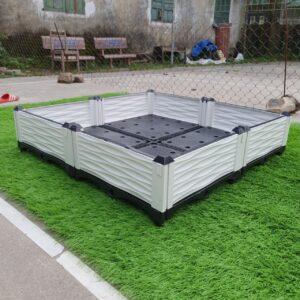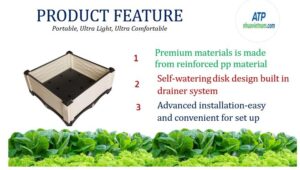In the context of increasing urbanization, living spaces are gradually shrinking, especially in major cities. Growing clean, organic vegetables at home has become a trend that not only helps save costs but also provides a safe food source for families. One of the most popular solutions for this is using plastic pots for gardening. So why are plastic pots so favored, and what is the potential for developing homegrown organic vegetable gardens?
1. Benefits of Using Plastic Pots for Home Gardening
a. Affordable Cost
Plastic pots are more affordable compared to those made from ceramic, porcelain, or cement. This suits the needs of people who want to invest in a small home garden without spending too much initially. The variety of sizes, shapes, and colors of plastic pots makes it easy for consumers to choose the right product for their space and household needs.
b. Durability and Convenience
Plastic pots are made from lightweight, durable materials that are resistant to damage from impacts. This makes it easy for gardeners to move the pots around, adjusting their placement according to sunlight and environmental conditions of different plants. Additionally, plastic pots are not affected by harsh weather conditions such as rain, strong winds, or intense sunlight, ensuring the plants are always in optimal condition.
c. High Flexibility
With the ability to easily drill drainage holes and adjust sizes, plastic pots allow users to create a good drainage system, preventing waterlogging for plants. Moreover, plastic pots can be stacked, saving space for families with limited areas such as apartments or townhouses.
2. The Trend of Growing Organic Vegetables at Home

a. Demand for Safe Food
In recent years, numerous food safety incidents have raised concerns about the use of pesticides and chemical fertilizers in agriculture. This has prompted many families to grow organic vegetables at home to ensure the health and safety of their meals.
b. Combining Gardening with Home Decoration
Growing organic vegetables not only provides food but has also become part of a home decoration trend. Neatly arranged green vegetable pots on balconies, rooftops, or small garden corners inside homes not only create a refreshing, green space but also help improve mood and reduce stress.
c. Developing Family-Based Economic Models
Many families are now utilizing small home spaces to grow vegetables and share or sell them to neighbors and friends. This not only brings additional income but also fosters community connection and raises awareness about the use of clean and sustainable food.
3. Opportunities and Challenges
a. Development Potential
With the development of gardening support products such as nutrient-rich soil, organic fertilizers, and convenient plastic pots, home gardening has never been easier. Plastic pots are also being continuously improved with smarter designs that cater to both aesthetics and practicality. Especially with the trend towards green living and sustainable consumption, home vegetable gardening is predicted to grow significantly in the near future.
b. Challenges
Some challenges include a lack of gardening knowledge, insufficient time for care, and harsh weather conditions. However, with the support of technology such as automatic irrigation systems, moisture sensors, and online courses on gardening techniques, people can easily overcome these difficulties.
4. Conclusion

Plastic pots, with their convenience and affordability, have become the top choice for those wanting to develop a homegrown vegetable garden. Not only do they provide a clean food source, but this model also offers mental health benefits, fosters social connections, and promotes a sustainable lifestyle. Though there are some challenges, with technological advancements and growing environmental awareness, home vegetable gardening is poised to become a booming trend in the future.

